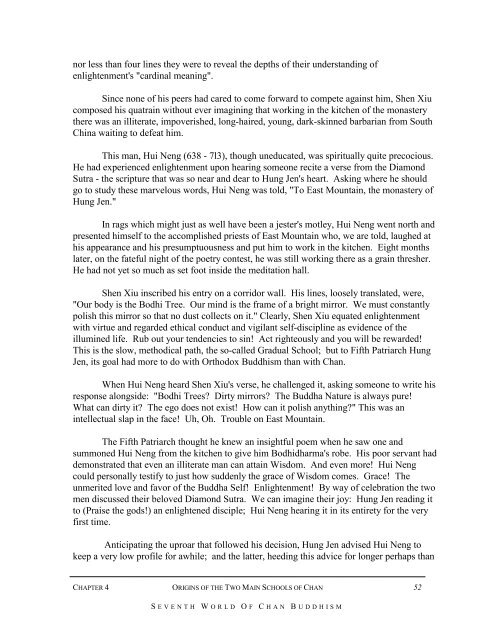seventh world of chan buddhism - Zen Buddhist Order of Hsu Yun
seventh world of chan buddhism - Zen Buddhist Order of Hsu Yun
seventh world of chan buddhism - Zen Buddhist Order of Hsu Yun
Create successful ePaper yourself
Turn your PDF publications into a flip-book with our unique Google optimized e-Paper software.
nor less than four lines they were to reveal the depths <strong>of</strong> their understanding <strong>of</strong><br />
enlightenment's "cardinal meaning".<br />
Since none <strong>of</strong> his peers had cared to come forward to compete against him, Shen Xiu<br />
composed his quatrain without ever imagining that working in the kitchen <strong>of</strong> the monastery<br />
there was an illiterate, impoverished, long-haired, young, dark-skinned barbarian from South<br />
China waiting to defeat him.<br />
This man, Hui Neng (638 - 7l3), though uneducated, was spiritually quite precocious.<br />
He had experienced enlightenment upon hearing someone recite a verse from the Diamond<br />
Sutra - the scripture that was so near and dear to Hung Jen's heart. Asking where he should<br />
go to study these marvelous words, Hui Neng was told, "To East Mountain, the monastery <strong>of</strong><br />
Hung Jen."<br />
In rags which might just as well have been a jester's motley, Hui Neng went north and<br />
presented himself to the accomplished priests <strong>of</strong> East Mountain who, we are told, laughed at<br />
his appearance and his presumptuousness and put him to work in the kitchen. Eight months<br />
later, on the fateful night <strong>of</strong> the poetry contest, he was still working there as a grain thresher.<br />
He had not yet so much as set foot inside the meditation hall.<br />
Shen Xiu inscribed his entry on a corridor wall. His lines, loosely translated, were,<br />
"Our body is the Bodhi Tree. Our mind is the frame <strong>of</strong> a bright mirror. We must constantly<br />
polish this mirror so that no dust collects on it." Clearly, Shen Xiu equated enlightenment<br />
with virtue and regarded ethical conduct and vigilant self-discipline as evidence <strong>of</strong> the<br />
illumined life. Rub out your tendencies to sin! Act righteously and you will be rewarded!<br />
This is the slow, methodical path, the so-called Gradual School; but to Fifth Patriarch Hung<br />
Jen, its goal had more to do with Orthodox Buddhism than with Chan.<br />
When Hui Neng heard Shen Xiu's verse, he challenged it, asking someone to write his<br />
response alongside: "Bodhi Trees? Dirty mirrors? The Buddha Nature is always pure!<br />
What can dirty it? The ego does not exist! How can it polish anything?" This was an<br />
intellectual slap in the face! Uh, Oh. Trouble on East Mountain.<br />
The Fifth Patriarch thought he knew an insightful poem when he saw one and<br />
summoned Hui Neng from the kitchen to give him Bodhidharma's robe. His poor servant had<br />
demonstrated that even an illiterate man can attain Wisdom. And even more! Hui Neng<br />
could personally testify to just how suddenly the grace <strong>of</strong> Wisdom comes. Grace! The<br />
unmerited love and favor <strong>of</strong> the Buddha Self! Enlightenment! By way <strong>of</strong> celebration the two<br />
men discussed their beloved Diamond Sutra. We can imagine their joy: Hung Jen reading it<br />
to (Praise the gods!) an enlightened disciple; Hui Neng hearing it in its entirety for the very<br />
first time.<br />
Anticipating the uproar that followed his decision, Hung Jen advised Hui Neng to<br />
keep a very low pr<strong>of</strong>ile for awhile; and the latter, heeding this advice for longer perhaps than<br />
CHAPTER 4 ORIGINS OF THE TWO MAIN SCHOOLS OF CHAN<br />
S EVENTH W ORLD O F C HAN B UDDHISM<br />
52


